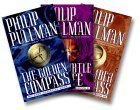Last year, I read two amazing books by Julia Holden. She was kind enough to grant me an interview when I contacted her to tell her how much I enjoyed her work, and I’ve just come up for air after writing a bunch of articles about term life insurance, so I thought it was time to post it. Because the name “Julia Holden” is a pseudonym, there’s no picture of the author, so instead, I offer pictures of the two books she penned under this name:


I have spend considerable portions of my life in Indiana, New York, Massachusetts, Connecticut, Florida, Hawaii, California, and Paris (France, not Texas), although not necessarily in that order. For seven years, I served as an executive for a major motion picture studio in Los Angeles, and I continue to work in and around the entertainment industry. My family and I are in the process of moving from Southern California to glorious, gorgeous Hawaii. For complicated reasons, personal and professional, “Julia Holden” is, alas, a pseudonym.The first, and only, creative writing class I ever took was in high school. My teacher was a nice man who wrote college recommendations for me (I went) and encouraged me to pursue a career in journalism (I didn’t). The teacher’s name was Mr. McCourt. Frank (Angela’s Ashes) McCourt. Who knew?
One Dance in Paris is my second novel, following A Dangerous Dress.
Like Linda Stone, the heroine of One Dance in Paris, I believe deeply in our capacity to reinvent ourselves in fabulous ways, and if that involves jetting off to fabulous places, all the better. Also like Linda (and like Jane Stuart, the heroine of A Dangerous Dress), I am deeply devoted to travel, fashion, and drinking lovely wines and cocktails in exotic locations. I satisfy those cravings in Paris and New York – and now, in my new home of Hawaii – as often as I possibly can. Unlike Linda in One Dance in Paris, I have never danced scandalously on the stage of the Folies Bergère. And, unlike Jane in A Dangerous Dress, I have not met Giorgio Armani.
Yet.
Julia Holden’s most recent novel is One Dance in Paris. She can be found on the web at JuliaHolden.com.
* * * * *



